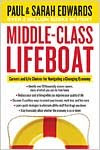
I had a wonderful 4
th of July. Dear Sons and Dear Ex were out of town, and I declared my independence from chores and housework, and read all day long. Oh, bliss, oh joy!
It was the most perfect day imaginable: warm and sunny, low humidity, a breeze ruffling the leaves; the sounds of cheerful extended clans gathering next door and across the alley, the smell of barbecue. A day straight out of
e. e. cummings:
i thank You God for this most amazing
day: for the leaping greenly spirits of tees
and a blue true dream of sky, and for everything
which is natural which is infinite which is yes
Digression #1: I went in search of another
e e cummings poem, which was in itself a digression, and searched through a paper file of clippings and cartoons I've saved, stuffed full of
New Yorker cartoons, many from my high school years. It was a three minute flip through a lifetime of good laughs, layered backwards through time. I hope that when it's time for my life to flash before my eyes it will include some of these cartoons.
Digression #2: The poem I was looking for was on a greeting card I'd received many years ago. I looked through a notebook stuffed with poems, started in junior high; through the clippings file, which also dates back to junior high, and a brief glance through a set of monthly files that I used a lot when the kids were little, with pictures and activities sorted by month. My point, and I do have one, is this: how much nicer it would have been if those assorted lifetime collections of good stuff were dumped in one big data folder, and tagged.
I just finished reading
David Weinberger's "
Everything is Miscellaneous; the power of the new digital disorder. " He describes "three orders of order." The first order is the physical arrangement of things. The
Bettman Archive, a collection of historic photos, is a vast first-order organization: a collection of actual objects, arranged in an order to facilitate finding. The photos, stored in a cool underground vault, are arranged by collection, in the order in which the
Bettman acquired other smaller collections over time. Within collections the photos are often arranged chronologically. Other examples of first order collections are silverware in drawers, books on shelves, and clippings in file folders. The enormity of the
Bettman Archive means that finding a given photo, or a photo with certain characteristics ("a civil war soldier eating a meal outdoors,") is incredibly difficult and nigh unto impossible. (Note: some of the Bettman photos are now available online.)
The card catalog in the
Bettman Archive is a second order of order. Information about the objects is stored separately from the objects themselves. This is a great improvement, but still insufficient. Not all the photos are cataloged; some are in yellowing ledgers waiting to be cataloged. Even the items cataloged do not contain all the information one would wish: to find a civil war soldier eating a meal outdoors, one could could eliminate thousands of photos not cataloged with the subject "civil war," but one would have to look through thousands of civil war photos in hopes of finding a soldier eating a meal outdoors. And there might be some great photos that aren't cataloged at all, or don't include "civil war" as a catalog subject.
Enter the third order of order. If the photos were digitally scanned, they could be
tagged with as many key words as desired. Current library catalogs are based on a model of scarce digital storage space, and before that, the size of a 3x5 card limited entries. Now we have all the room we want, and the next generation of card catalogs will reflect this, probably in a combination of professionally selected subject and keyword settings, and tags and reviews contributed by readers/patrons/customers.
The photo we're looking for might be tagged with Civil War, soldier, mess tent, eating, outdoor meals, the type of camera used for the photo, the photographer's name, the date, the name of the original collection and any subsequent collections it was part of. Oh, and the name, rank, and regiment of the soldier and his home state. And the state in which the picture was taken. Lots of room for everything!
Corbis, the Bettman's parent company, has a digital photo archive, a third-order organizational method.
So we should be able to go to Corbis and find that Civil War soldier. Weinberger did, but I couldn't duplicate his search. I looked for about five minutes without success. We're still not in that perfect digital world!
For examples of tagging, if you aren't familiar with this, see
Flickr.com or click to my links on
del.icio.us.This is what
Weinberger means by "everything is miscellaneous" -- this uncoupling of data from second-order systems, the creating of multiple "leaves" heaped on the floor, accessible in any order the end user wishes to sort them or use them.
His book is a great introduction to new ways information is shared and used. Three key points: * Information is most valuable when it is thrown
into a big digital "pile" to be filtered and organized by users themselves.
* Instead of relying on experts, groups of
passionate users are inventing their own ways of discovering what they know and want.
* Smart companies do not treat information as an asset to be guarded, but let it loose to be "mashed up," gaining market awareness and customer loyalty.
When I went to library school, I was thrilled to be able to take a class called, "The Organization of Knowledge," and then bitterly disappointed when it wasn't a description of varieties of ways to organize knowledge, and how those organizational schemes affect how we view "reality." Instead it was a course in cataloging, a "how to" to put materials into organizational cubbyholes with the Library of Congress or Dewey Decimal system.
Weinberger provides a lot of anecdotal description of the ways knowledge has been organized, which book geeks, library geeks, and info geeks will enjoy. You know who you are.
Back to the Fourth of July
I intended to blog about
Fareed Zakaria's The Post-American World on July 4
th, thought it would be very fitting, but it was too lovely to even think of hanging around a computer, so we'll have to settle for a Post-July-4
th blog about The Post-American World.
I've been hearing predictions of the demise of America's greatness for as long as I can remember. Not only in the sense that many of us have whenever our party or our candidate is not in power, that we're headed in the wrong direction, but a deeper fear of financial ruin, joblessness, lawlessness, powerlessness; the comparisons to the Roman Empire are legion (excuse the pun.) I've had those fears myself. During the financial crises in the 80's (the only near-term example of a time in which the "misery index" of joblessness and inflation surpassed our current deep financial woes), businesses all around my neighborhood were closing. Britain seemed to be circling the drain, with strikes and financial chaos.
And anyone who has watched the fantastic growth (not without social and environmental costs) in China, or in India or southeast Asia, has felt the tremors rocking our assumptions that we are the best, period.
Zakaria says, "I began to notice things that a short time ago were unimaginable. The richest man in the world lives in Mexico City. The tallest building in the world is in Taipei, and Dubai is building a taller building. . . The largest factory in the world is in China. The largest refinery is in India. I was in
Las Vegas one day and thought, At least we have this. It turns out we don't. The largest casino hotel in the world now is the Venetian in Macao, and Macao just overtook
Las Vegas with the largest gambling revenues in the world. Shopping, America's greatest leisure time activity? The last time I was in Beijing they showed me the largest mall in the world, which has since been eclipsed by another Chinese mall. It turns out the top ten malls in the world are all outside the United States. Just three years ago almost every category I gave you would have been topped by America. The change is fast and has only just begun."
Zakaria foresees a world in which power and economic strength are more widely shared. His key message is that these changes are not about the decline of the United States but "the rise of the rest." He envisions the United States playing a key role in a world of negotiations and strategy -- a role only we can play, based on our military and economic strength. The book is a great read;
Zakaria is a journalist, not just a policy wonk, and the book hurtles along on a wave of enthusiastic optimism about our future.


